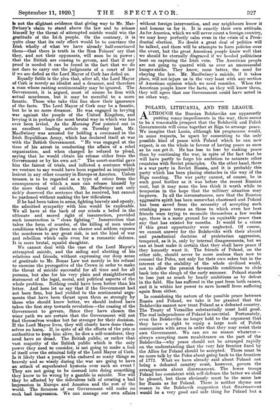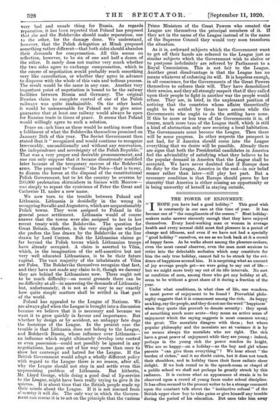POLAND, LITHUANIA, AND THE LEAGUE. A LTHOUGH the Russian Bolsheviks are
apparently putting many impediments in the way, there seems to be a reasonable prospect that the Bolshevik and Polish Governments will come together at Riga to arrange peace. We imagine that Lenin, although his programme would, in some respects, be upset by consenting to the only possible kind of peace with Poland which he can now expect, is on the whole in favour of having peace as soon as he can get it. He has less to lose by making peace than by continuing the war, in spite of the fact that he will have partly to forgo his ambition to saturate other countries with Soviet principles. On the other hand, there is a war party in Soviet Russia, and it is probably this party which has been placing obstacles in the way of the Riga meeting. The war party cannot, of course, be in such good feather as it was before the recent Russian rout, but it may none the less think it worth while to temporize in the hope that the military situation may improve. In all the circumstances, now that the Russian aggressive spirit has been somewhat chastened and Poland has been saved from the necessity of accepting such crushing peace terms as those to which even her best friends were trying to reconcile themselves a few weeks ago, there is a surer ground for an equitable peace than any that has existed for months. It would be a crime if this great opportunity were neglected. Of course, we cannot answer for the Bolsheviks with their absurd and paradoxical doctrine of proletarian aggression, tempered, as it is, only by internal disagreements, but we can at least make it certain that they shall have peace if they honestly want it. The friends of Poland, on the other side, should never be more zealous than now to counsel the Poles, not only for their own sakes but in the interest of the stability of the whole civilized world, not to allow the present favourable conditions to slide back into the slough of the early summer. Poland stands to lose just as much by heady ambitions as by defeat in the field. She has suffered in the past from both causes, and it is within her power to save herself from suffering again from either.
In considering the nature of the possible peace between Russia and Poland, we take it for granted that the Bolsheviks cannot now treat Poland as a defeated country. The Treaty of Versailles substantially must hold good. The real independence of Poland is essential. Fortunately, even the Bolsheviks no longer hold to the argument that they have a right to equip a large mob of Polish communists with arms in order that they may resist their own Government. We can see no reason whatever— always excepting mere recalcitrance on the part of the Bolsheviks—why peace should not be arranged rapidly on the understanding that the very fair frontier fixed by the Allies for Poland should be accepted. There must be no more talk by the Poles about going back to the frontiers of 1772. What we have already said about Poland not being a defeated country must, however, govern the arrangements about disarmament. The fewer troops Poland has consistent with self-defence the better we shall be pleased, but there obviously must be the same law for Russia as for Poland. There is neither rhyme nor reason in the Bolshevik suggestion that disarmament would be a very good and safe thing for Poland but a very bad and unsafe thing for Russia. As regards reparation, it has been reported that Poland has proposed that she and the Bolsheviks should make reparation, one to the other, for the damage done. We understand, however, that the Polish delegation at Minsk proposed something rather different—that both sides should abandon their, demands for compensation. All this seems on reflection, however, to be six of one and half a dozen of the other. It surely does not matter very much whether the two sides agree to exchange compensation, which in the course of negotiation would probably reach something very like cancellation, or whether they agree in advance to dispense with the whole of this vain and tedious process. The result would be the same in any case. Another very important point of negotiation is bound to be the railway facilities between Russia and Germany. The original Russian claim to complete control of one of the Polish railways was quite inadmissible. On the other hand, it would be unreasonable for Poland not to give some guarantee that at least one railway would always be open for Russian trade in times of peace. It seems that Poland would willingly agree to such a solution.
Peace on tuch lines as these would be nothing more than a fulfilment of what the Bolsheviks themselves promised on January 26th of this year. The Soviet Government then stated that it " recognized and would continue to recognize irrevocably, unconditionally and without any reservation, the independence and sovereignty of the Polish Republic." That was a very proper and desirable pronouncement, and one can only suppose that it became disastrously modified later because of the temporary success of the Bolshevik arms. The proposal to " disarm " the Poles—that is to say, to disarm the forces at the disposal of the constitutional Polish Government, but to let the country be overrun by 200,000 proletarian skirmishers in liaison with Moscow— was simply to repeat the cynicisms of Peter the Great and Catherine II. under a new name.
We now turn to the trouble between Poland and Lithuania. Lithuania is decidedly in the wrong in occupying Suvalki and Augustovo, which are unquestionably Polish towns. They were assigned to Poland in the general peace settlement. Lithuania would of course answer that the towns were also assigned. to her in her recent treaty with the Bolsheviks. The question for Great Britain, therefore, is the very simple one whether she prefers the line drawn by the Bolsheviks or the line drawn by Lord Curzon. But the Lithuanian claims go far beyond the Polish towns which Lithuanian troops have already occupied. A claim is asserted to Vilna, which, in the imagination of the self-assertive but not very well educated Lithuanians, is to be their future capital. The vast majority of the inhabitants of Vilna are Poles. The Bolsheviks themselves recognize that fact, and they have not made any claim to it, though we daresay they are behind the Lithuanians now. There ought not to be much difficulty—on moral grounds there can be no difficulty at all—in answering the demands of Lithuania ; but, unfortunately, it is not at all easy to say exactly how quite simple matters shall be settled in that part of the world.
Poland has appealed to the League of Nations. We are always glad when the League is brought into a discussion because we believe that it is necessary and because we want it to grow quickly in favour and importance. But whether by design or by accident, an unhappy fate dogs the footsteps of the League. In the present case the trouble is that Lithuania does not belong to the League, and Bolshevik Russia, whose influence over Lithuania— an influence which might ultimately develop into control or even possession—could not possibly be ignored in any negotiations, has gone out of her way more than once to show her contempt and hatred for the League. If the British Government would adopt a wholly different policy with regard to the League there is no reason, after all, why the League should not step in and settle even this unpromising problem of Lithuania. But hitherto, Mr. Lloyd George, while doing a good deal of lip-service to the League, might have been really trying to give it its quietus. It is about time that the British people made up their minds about the League. If it is not rescued from ot•scurity it will die. The only way in which the Govern- ment can rescue it is to act on the principle that the various Prime Ministers of the Great Powers who created the League are themselves the principal members of it. If they act in the name of the League instead of in the name of the Supreme Council they would very soon transform the situation.
As it is, awkward subjects which the Government want to get off their -hands are referred to the League just as similar subjects which the Government wish to shelve or to postpone indefinitely are referred by Parliament to a Royal Commission. This is not fair to the League. Another great disadvantage is that the League has no means whatever of enforcing its will. It is hopeless enough, in all conscience, for the Governments of the Great Powers themselves to enforce their will. They have demobilized their armies, and they all strongly suspect that if they called upon their people to fight in another war the people would refuse. They are, in brief, in the unpleasant position of noticing that the countries whose affairs theoretically ought to be settled by them have armies while the Governments who ought to do the settling have none. If this be more or less true of the Governments it is, of course, much more true of the League itself, which is still a kind of abstraction only now securing a local habitation. The Governments must become the League. Then there will be some progress. In other respects the prospect is not bad, for if America should come into the League everything that we desire will be possible. Already there are signs that both the Presidential candidates in America feel the advisability of satisfying what they believe to be the popular demand in America that the League shall be accepted. We have never doubted that if Europe does its duty by the League, America in the end—in our belief sooner rather than later—will play her part. But a necessary condition is that Europe should prove by her sincerity that America is either missing an opportunity or is being unworthy of herself in staying outside.



































 Previous page
Previous page